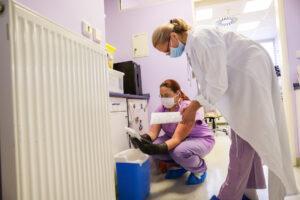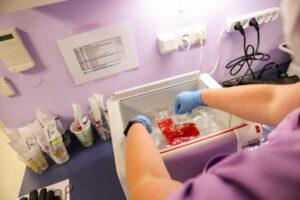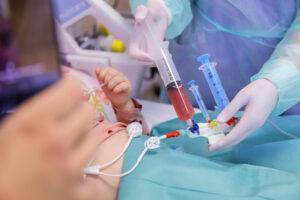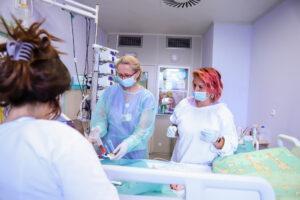Neonatal screening project SCID (severe combined immunodeficiency) and SMA (spinal muscular atrophy) in the Czech Republic
At the beginning of this year, a nationwide pilot program was launched in the Czech Republic, which expanded the range of neonatal screening with two new diseases - SMA (spinal muscular atrophy) and SCID. (severe combined immunodeficiency). In both cases, these are serious life-threatening diseases, the early detection of which has a major impact on the patient's prognosis. The pilot project takes place under the auspices of the Ministry of Foreign Affairs of the Czech Republic in cooperation with the National Screening Center of the IHIS.
SMA (spinal muscular atrophy)
Spinal muscular atrophy (SMA) is a genetic, very serious neurodegenerative disease of the motoneurons of the anterior horns of the spinal cord. The disease is clinically manifested by progressive muscle weakness. In most cases, muscle weakness appears early in birth, during infancy or toddlerhood.
"If we didn't treat children with SMA, they would usually never be able to walk or even sit on their own and die prematurely from respiratory failure in the first years of life." says doc. MUDr. Jana Haberlová, Ph.D. from the Department of Pediatric Neurology, 2nd Medical Faculty, Charles University and University Hospital Motol.
Every year, about 11 children with a role for SMA are born in the Czech Republic. Until 2016, SMA was a causally incurable disease. The first drug registered was nusinersen (Spinraza). In 2018 the LP onasemnogen abeparvovek (Zolgensma) was approved and in 2019 the third causal LP risdiplam (Evrysdi) was approved.
However, the availability of causal SMA treatment does not imply the possibility of curing the patient. Causal treatment of symptomatic patients is able to slightly improve and especially stabilize their condition. The reason is the fact that the diagnosis at the level of symptoms corresponds to a situation where there has already been irreversible damage to skeletal muscles.
"It is the rate of irreversible loss of motoneurons and the resulting changes in skeletal muscle that is the reason for the worldwide efforts to include SMA in the neonatal screening program, to enable diagnosis before the development of clinical symptoms," explains Associate Professor Haberlová.
SCID (severe combined immunodeficiency)
Of the congenital immune disorders, the most serious disease is called SCID, a severe combined immunodeficiency. The essence of SCID is a deep disorder at the level of T lymphocytes, practically their absence. T lymphocytes play an important role in the immune system, they are key cells that provide so-called cellular immunity, control the immune response and also have powerful functions. Their role is so crucial that they cannot survive without T cells.
Bone marrow transplantation, specifically hematopoietic stem cells, is an essential treatment for patients with SCID, which is to some extent causal, replacing stem cells with a gene disorder with healthy donor stem cells, which will allow the development of a functional immune system.
"For patients, the availability of hematopoietic stem cell transplantation was practically the only chance of survival. However, the situation was complicated because, due to their severe immune deficiency, they suffered from repeated and severe infections very soon after birth. Late diagnosis in the field of recurrent infections worsened the prospects of successful bone marrow transplantation. It soon became apparent that early diagnosis and transplantation before the onset of infections significantly improved the prospects of successful transplantation and the prognosis of patients. " explains prof. MUDr. Anna Sediva, DSc. Head of the Institute of Immunology, 2nd Faculty of Medicine, Charles University and Motol University Hospital.
In the Czech Republic, 1-2 patients per year have been detected for a long time, but there are also years without detection of the disease, when children are very likely to escape detection and die under another descriptive diagnosis or serious infection without evidence of immunodeficiency.
National pilot SMA and SCID screening program
From the very beginning, the Czech Republic has remained at the forefront of screening activities in the field of neonatal screening; currently, 18 diseases are being screened, including mainly metabolic disorders. Since January 2022, a nationwide pilot program has been launched in the Czech Republic, which has expanded neonatal screening to include SMA (spinal muscular atrophy) and SCID (severe combined immunodeficiency). The pilot project is voluntary (Informed consent to inclusion must be signed). Diagnosis is performed from a standard dry drop of neonatal screening. This is a collection and examination in which the blood sample is transferred to filter paper and dried. Only 4 drops of blood are needed to perform the test. In newborns, a blood sample is taken by injection into the heel.
SMA screening
As this is a very serious disease, where early diagnosis plays a crucial role in the effectiveness of treatment, the possibility of examining the aptitude for SMA from a dry drop of neonatal screening is offered to children born in 2021 retrospectively. So far, one positive patient has been detected within this mechanism, who, although found to be mildly symptomatic by a neurologist, has so far been led by a pediatrician as a healthy child. This child was also treated with a single gene therapy at the Motol University Hospital and his motor development is favorable.
SCID screening
The essence of the recognized screening test is to determine the number of so-called TRECs (T cells receptors excision circles), which reflects the number of functional T cells in a child. The laboratory neonatal SCID screening itself is performed in two centers, in Prague in the VFN screening laboratory and in Brno in the laboratories of the Brno University Hospital. At the University Hospital in Motol, the diagnostic part of the screening is provided by the Institute of Immunology of the 2nd Medical Faculty of Charles University and the Motol University Hospital, where a clinical and laboratory immunological examination will be performed to confirm the immune disorder. At the same time, a genetic examination is being carried out, used to detect an already specific gene disorder. The output of these confirmatory examinations is then a decision on further action. If bone marrow transplantation is indicated, it is performed at the transplantation unit of the Department of Pediatric Hematology and Oncology, 2nd Medical Faculty, Charles University and Motol University Hospital. Since the beginning of 2022, we have dealt with five captured patients at FNM. In one captured child, SCID disease was confirmed, with the absence of T lymphocytes with a confirmed genetic cause. All measures were taken, members of an exemplary cooperating family were examined, where an HLA identical sibling was found as an ideal donor of bone marrow cells. Even at a time complicated by COVID-19, bone marrow transplantation was performed. The child is currently in home care and is still being monitored.
These cases illustrate the positive value of the screening system. In our case and in the others that will follow, there is a great chance of saving the lives of the captured children, together with a great increase in the quality of their lives and the lives of their loved ones.
Media Contact:
Mgr. Pavlína Danková, phone: 724 227 503, e-mail: pavlina.dankova@fnmotol.cz
doc. MD Jana Haberlová Ph.D., email: jana.haberlova@fnmotol.cz
prof. MUDr. Anna Šedivá, DSc., Tel: 603 166 112, Email: anna.sediva@fnmotol.cz
Press release for download: SCID and SMA neonatal screening project (551KB)



